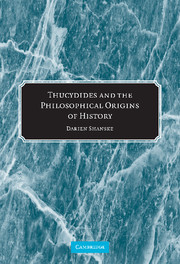Book contents
- Frontmatter
- Contents
- Acknowledgments
- Introduction
- 1 Thucydides's Vision
- 2 The Case of Pericles
- 3 Deinon, Logos, and the Tragic Question Concerning the Human
- 4 Thucydidean Temporality
- Appendix I Restoring Key Terms 1.1–1.23
- Appendix II Pretragic History of Deinon
- Appendix III Wittgenstein on Fly-Bottles, Aspect Seeing, and History
- Appendix IV Heidegger on World and Originary Temporality
- Notes
- Bibliography
- Index
3 - Deinon, Logos, and the Tragic Question Concerning the Human
Published online by Cambridge University Press: 19 August 2009
- Frontmatter
- Contents
- Acknowledgments
- Introduction
- 1 Thucydides's Vision
- 2 The Case of Pericles
- 3 Deinon, Logos, and the Tragic Question Concerning the Human
- 4 Thucydidean Temporality
- Appendix I Restoring Key Terms 1.1–1.23
- Appendix II Pretragic History of Deinon
- Appendix III Wittgenstein on Fly-Bottles, Aspect Seeing, and History
- Appendix IV Heidegger on World and Originary Temporality
- Notes
- Bibliography
- Index
Summary
Introduction
It is a commonplace to label Thucydides's History “tragic.” The goal of this chapter is to give this label substance and importance. For this reason, this chapter will do more than just discuss the famous passages in Thucydides that have a tragic resonance, such as the Melian Dialogue, which actually has a tragic format as well. Our starting point will instead be the phenomenon of tragedy itself since it is important to justify why we are pursuing Thucydides's connection with tragedy beyond his connection with any other contemporary intellectual or cultural phenomenon. We will then explore some tragic elements in a story we have already encountered, that of Harmodius and Aristogeiton. This short reading is offered only as an indicator to the aspect of tragedy in Thucydides that will be focused upon, namely, the notion of the deinon. Within Sophocles this word is at the center of the tragic condition, and it plays a similar role in Thucydides.
The development of the deinon in tragedy will take up the bulk of this chapter and will require considering its use before tragedy. No doubt it may seem at points that we are traveling too far from Thucydides and too little into many of the issues raised by the tragedies. There is no way around this; this is a book about Thucydides that wishes to rely on more than mere generalities as to what aspects of tragedy inform his work and give it such disclosive power.
- Type
- Chapter
- Information
- Thucydides and the Philosophical Origins of History , pp. 69 - 118Publisher: Cambridge University PressPrint publication year: 2006

